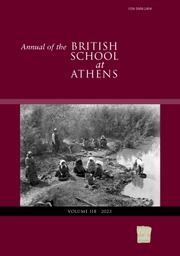No CrossRef data available.
Article contents
Antiquities from Thiaki
Published online by Cambridge University Press: 11 October 2013
Extract
In view of the proposed excavations it may be useful to consider some early finds from the island.
Charles Philippe de Bosset, Swiss by birth but a Colonel in the British army, was the governor of Cephallenia 1810–13 and became the first collector of Mycenaean pottery. There is a large case in the Musée d'Histoire at Neuchâtel containing his finds, each object labelled with its provenience. Cephallenia provided the bulk of the spoil, among it the late Mycenaean vases from this collection that have already been published.
Fig. 1, No. 1 and Fig. 2 shew a short bronze sword (length 15·8 in.), now in the Musée d'Histoire, which I publish by kind permission of the Director, M. de Pury, who gives me the following extract from the old catalogue of the Museum :—“ Il a été découvert dans une des tombes taillées dans le roc avec dalles pour couvertures que le Col. de Bosset a fait ouvrir à Ithaque au pied du Château d'Aito.” There is a note that a similar weapon was sold in England.
- Type
- Research Article
- Information
- Copyright
- Copyright © The Council, British School at Athens 1928
References
page 113 note 1 Kavvadias, , Προϊστορικὴ ᾿Αρχαιολογία, p. 365Google Scholar, Figs. 437–443. The de Bosset collection is also described by Dessoulavy, Paul, Rev. Arch. 1900, pp. 128–147Google Scholar.
page 113 note 2 Evans, Prehistoric Tombs of Knossos, Fig. 109.
page 113 note 3 Evans, op. cit., p. 108.
page 113 note 4 Montelius, Vorklassische Chronologie Italiens, Pl. XXIII, Fig. 8; La Civilisation Primitive en Italie, I. Planches, série B, 28, 10 and 11. Naue, Vorrömischer Schwerter, Pl. XXIX.
page 114 note 1 B.M. Cat. of Bronzes, 2753.
page 114 note 2 Homerische Epos, p. 337.
page 114 note 3 Newton, , Proceedings at Corfu, p. 91Google Scholar, 5. Vischer, , Epigraphische und Archäologiscke Beiträge aus Griechenland, p. 3Google Scholar. Vischer's authority was no doubt Woodhouse's catalogue. The alleged provenience of finds from unrecorded excavations is always suspect. On the other hand, Ithaca was the most probable source for such a sword in 1853.
page 115 note 1 Fouilles de Delphes, v. p. 8Google Scholar.
page 115 note 2 Evans, op. cit., Fig. 109.
page 115 note 3 Ἐϕ. Ἀρχ, 1891, Pl. 2, p. 25Google Scholar.
page 115 note 4 B.M. Guide to Greek and Roman Life, Fig. 89, b.
page 115 note 5 Furtwängler, and Loeschke, , Mykenische Vasen, Text, Taf. d. 11Google Scholar.
page 115 note 6 Museo Italiano, 1888, Vol. II. Pl. XIII, No. 5, and p. 906Google Scholar. This is the official publication of the Idaean cave, but the objects on Plate XIII come from Psychro. I cannot trace a Mycenaean sword from the Idaean cave.
page 115 note 7 Evans, op. cit., p. 112.
page 115 note 8 B.M. Bronze Age Guide, Fig. 169.
page 116 note 1 Ἐϕ. Ἀρχ, 1904, pp. 30 and 46Google Scholar.
page 116 note 2 See Evans, op. cit., pp. 108 ff.
page 116 note 3 Fouilles de Delphes, v. pp. 9, 10Google Scholar. J.H.S. Vol. of Plates, LXXXIII, Figs. 6–10.
page 116 note 4 Archaeologia, XXXIII, Pl. 11, Fig. 1.
page 116 note 5 Op. cit., p. 46. Cf. B.M. Cat. of Jewellery, 1543 and 1556 fr. Tharros.


